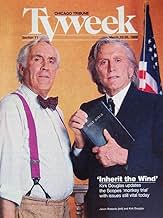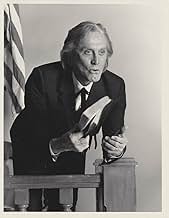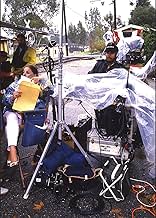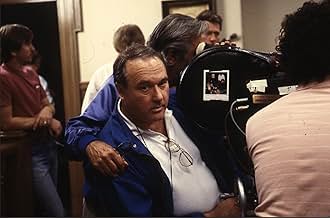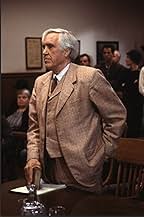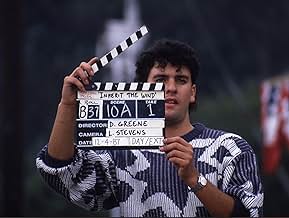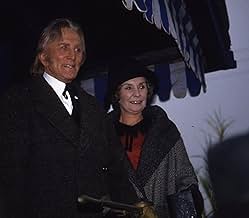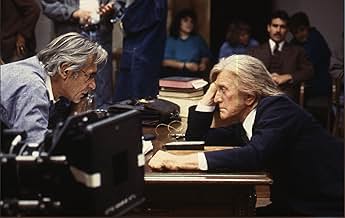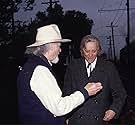अपनी भाषा में प्लॉट जोड़ेंA biblical orator opposes a liberal lawyer defending a man for teaching Darwinism in the 1920s South.A biblical orator opposes a liberal lawyer defending a man for teaching Darwinism in the 1920s South.A biblical orator opposes a liberal lawyer defending a man for teaching Darwinism in the 1920s South.
- निर्देशक
- लेखक
- स्टार
- 2 प्राइमटाइम एमी जीते
- 2 जीत और कुल 1 नामांकन
Tom McCleister
- Bailiff
- (as Thom McCleister)
Richard Gilbert-Hill
- Radio Newsman
- (as Richard Gilbert Hill)
फ़ीचर्ड समीक्षाएं
I thought Jason Robards was good as Darrow even if he didn't erase the memory of Spencer Tracy from my mind but I thought the usually fine Kirk Douglas was miscast as William Jennings Bryan (who was a glutton, not a movie star!) and didn't come close to Frederic March who even looked like Bryan. (Admittedly, Spencer always looked like Spencer.) He was reduced to playing the part as if it was Elmer Gantry and when Jason said that "a giant once lived in that body!" I didn't believe him for one second.
And where the old black and white version suggested the oppressive heat and humidity of Dayton, Tennessee, this one didn't even come close. Darren McGavin who played H. L. Mencken was quite good though and easily erased the memory of Gene Kelly in the original. And I've always adored Jean Simmons in most of what she did. Kyle Secor was the Scopes character (I mistook him for Matthew Broderick) and was very adequate.
I'd be interested to see (again?) the 1965 TV version with Melvyn Douglas and Ed Begley but I don't remember it at all if I did see it.
And where the old black and white version suggested the oppressive heat and humidity of Dayton, Tennessee, this one didn't even come close. Darren McGavin who played H. L. Mencken was quite good though and easily erased the memory of Gene Kelly in the original. And I've always adored Jean Simmons in most of what she did. Kyle Secor was the Scopes character (I mistook him for Matthew Broderick) and was very adequate.
I'd be interested to see (again?) the 1965 TV version with Melvyn Douglas and Ed Begley but I don't remember it at all if I did see it.
My thoughts on this remake of Inherit The Wind and the slant that it was given arise from one thing only, the possibility in early 1988 that Pat Robertson would be a presidential candidate. The main difference between the classic 1960 version and this television one is that Matthew Harrison Brady is considering yet a fourth run for the presidency. To bring the country back to God, or at least his version of God. Listening to Kirk Douglas as Brady and remembering the times that this television film was made, the context is essential to understand what was going on.
In real life of course William Jennings Bryan was thoroughly cured of the presidential bug by 1925. He was still very much an influence in the party, especially in rural areas such as Eastern Tennessee where the Scopes Trial took place. In real life Bryan would have been 68 in 1928 had he lived and I'm willing to bet he'd have fought mightily against the nomination of the Roman Catholic Alfred E. Smith.
In this version a lot of business is eliminated including the contempt citation that defense lawyer Henry Drummond is given and a favorite scene of mine where Brady is holding court for the press in the hotel restaurant, enjoying heaping helpfuls of roast beef and mashed potatoes while Drummond sits in the foreground with a tuna sandwich and a glass or milk.
The confrontation climax with Brady and Drummond is still basically the same with the added dialog about Brady maybe running for president again to bring the USA back to God. Again written for the 1988 television audience.
Jason Robards, Jr. is far closer to the truth of Clarence Darrow in his Henry Drummond than Spencer Tracy. Darrow was not as noble a creature as Tracy makes him out, but his performance did get him an Academy Award nomination. Robards is a lot more sneaky, still for me the best interpretation of Clarence Darrow is Orson Welles as Jonathan Wilk in Compulsion.
Kirk Douglas gets reunited with his Spartacus co-star Jean Simmons playing Mrs. Brady. By all accounts the real Mrs. Bryan was a very wise woman capable of a brake on her high flying husband when needed.
When I wrote a review for the 1960 Inherit the Wind which I did see in theaters back in the day, I said that the film was done from a quaint nostalgia point of view about what silly things we believed and fought over and how America had grown up in the interim. In 1960 who would have believed that fundamentalist Christianity would have a stranglehold on one of our major parties. This version of Inherit The Wind sadly takes that into account.
In real life of course William Jennings Bryan was thoroughly cured of the presidential bug by 1925. He was still very much an influence in the party, especially in rural areas such as Eastern Tennessee where the Scopes Trial took place. In real life Bryan would have been 68 in 1928 had he lived and I'm willing to bet he'd have fought mightily against the nomination of the Roman Catholic Alfred E. Smith.
In this version a lot of business is eliminated including the contempt citation that defense lawyer Henry Drummond is given and a favorite scene of mine where Brady is holding court for the press in the hotel restaurant, enjoying heaping helpfuls of roast beef and mashed potatoes while Drummond sits in the foreground with a tuna sandwich and a glass or milk.
The confrontation climax with Brady and Drummond is still basically the same with the added dialog about Brady maybe running for president again to bring the USA back to God. Again written for the 1988 television audience.
Jason Robards, Jr. is far closer to the truth of Clarence Darrow in his Henry Drummond than Spencer Tracy. Darrow was not as noble a creature as Tracy makes him out, but his performance did get him an Academy Award nomination. Robards is a lot more sneaky, still for me the best interpretation of Clarence Darrow is Orson Welles as Jonathan Wilk in Compulsion.
Kirk Douglas gets reunited with his Spartacus co-star Jean Simmons playing Mrs. Brady. By all accounts the real Mrs. Bryan was a very wise woman capable of a brake on her high flying husband when needed.
When I wrote a review for the 1960 Inherit the Wind which I did see in theaters back in the day, I said that the film was done from a quaint nostalgia point of view about what silly things we believed and fought over and how America had grown up in the interim. In 1960 who would have believed that fundamentalist Christianity would have a stranglehold on one of our major parties. This version of Inherit The Wind sadly takes that into account.
This 1988 version of INHERIT THE WIND tried a slightly different approach to the story than the film or the 1965 versions. Apparently there was a deeper delving into the historical material (and - unlike the period of the film and the first dramatic version on television - the resurgence of anti - evolutionary voters in the country) to make the story fairer.
Jason Robards played Drummond/Darrow very well - in the tradition of Muni, Tracy, and Melvyn Douglas. But it was the performance of Kirk Douglas as Brady/Bryan that was unique. As I have mentioned elsewhere in these reviews, Bryan did have valid reasons to dislike Darwinism aside from religious feelings. The issue of Social Darwinism, created by an English elitist snob named Herbert Spencer, had been grabbed by various people in power positions in big business and politics that suggested that the best people were the top of the evolutionary tree - and that big business had the right to destroy small competitors due to "survival of the fittest". Bryan hated this idea, as opposite to Jeffersonian Democracy. He actually intended, after his own humiliation on the witness stand by Darrow to put Darrow on the stand to explain his acceptance of Social Darwinism. Judge Raulston, the trial judge, refused to allow this.
If that had been brought out in this production, it would have set it apart and given a more balanced view of the two parties who clashed in Dayton. Instead, Douglas played Brady like a revivalist (similar to Begley, without Begley's physical resemblance to Bryan). But he also kept trying to keep up the friendly feelings that Darrow and Bryan had when both were fighting on the same side on political issues from 1893 to 1908. While all the productions include those moments of nostalgia between them, this attempted to suggest that Douglas/Brady hoped to "save" the soul of Robards/Drummond. It was a curious idea, but it just did not seem realistic (given their diametrically opposite views on evolution and the Tennessee law). I give this a 7 for the production but the approach was a misfire.
Jason Robards played Drummond/Darrow very well - in the tradition of Muni, Tracy, and Melvyn Douglas. But it was the performance of Kirk Douglas as Brady/Bryan that was unique. As I have mentioned elsewhere in these reviews, Bryan did have valid reasons to dislike Darwinism aside from religious feelings. The issue of Social Darwinism, created by an English elitist snob named Herbert Spencer, had been grabbed by various people in power positions in big business and politics that suggested that the best people were the top of the evolutionary tree - and that big business had the right to destroy small competitors due to "survival of the fittest". Bryan hated this idea, as opposite to Jeffersonian Democracy. He actually intended, after his own humiliation on the witness stand by Darrow to put Darrow on the stand to explain his acceptance of Social Darwinism. Judge Raulston, the trial judge, refused to allow this.
If that had been brought out in this production, it would have set it apart and given a more balanced view of the two parties who clashed in Dayton. Instead, Douglas played Brady like a revivalist (similar to Begley, without Begley's physical resemblance to Bryan). But he also kept trying to keep up the friendly feelings that Darrow and Bryan had when both were fighting on the same side on political issues from 1893 to 1908. While all the productions include those moments of nostalgia between them, this attempted to suggest that Douglas/Brady hoped to "save" the soul of Robards/Drummond. It was a curious idea, but it just did not seem realistic (given their diametrically opposite views on evolution and the Tennessee law). I give this a 7 for the production but the approach was a misfire.
This made for TV film version of the famous Lawrence and Lee Broadway success is a very enjoyable presentation, and captures two splendid veteran actors doing exceptional work in the twilight of their careers. During the years since its original theatrical release, there have been two more made for TV film versions of Inherit the Wind (IW). Each of the four performances has champions and critics. All of them are interesting and worth seeing. None is dull and to be avoided. That in itself is rather remarkable. The four versions are:
(1) 1960 theatrical film starring Fredric March and Spencer Tracy.
(2) 1965 made for TV film starring Ed Begley and Melvyn Douglas.
(3) 1988 made for TV film starring Kirk Douglas and Jason Robards.
(4) 1999 made for TV film starring George C. Scott and Jack Lemmon.
Something very interesting happens when these four versions are considered as one body of work. Let me explain. For simplicity, I'll refer to each version by its indicated number.
Item: Three of the eight actors who played leading roles in the four versions of IW also played the identical leading roles in either a theatrical or TV film version of Dr. Jekyll and Mr. Hyde. They are Fredric March (1), Spencer Tracy (1) and Kirk Douglas (3).
Item: Two actors who had principal roles in one version of IW also appeared in Days of Wine and Roses. The man starred in the theatrical movie version, and the woman originated the female leading role in the earlier TV version. They are Jack Lemmon (4) and Piper Laurie (4).
Item: Two actors who had principal roles in one version of IW also appeared as co-stars in the film Spartacus. They are Kirk Douglas (3) and Jean Simmons (3).
Item: Two actors who had principal roles in one version of IW also appeared as co-stars in the film The Hustler. They are George C. Scott (4) and Piper Laurie (4).
Item: Two actors who had principal roles in two different versions of IW also appeared as co-stars in the film The Hustler. They are George C. Scott (4) and Murray Hamilton (2).
Coincidence? Of course. But interesting? You bet!
(1) 1960 theatrical film starring Fredric March and Spencer Tracy.
(2) 1965 made for TV film starring Ed Begley and Melvyn Douglas.
(3) 1988 made for TV film starring Kirk Douglas and Jason Robards.
(4) 1999 made for TV film starring George C. Scott and Jack Lemmon.
Something very interesting happens when these four versions are considered as one body of work. Let me explain. For simplicity, I'll refer to each version by its indicated number.
Item: Three of the eight actors who played leading roles in the four versions of IW also played the identical leading roles in either a theatrical or TV film version of Dr. Jekyll and Mr. Hyde. They are Fredric March (1), Spencer Tracy (1) and Kirk Douglas (3).
Item: Two actors who had principal roles in one version of IW also appeared in Days of Wine and Roses. The man starred in the theatrical movie version, and the woman originated the female leading role in the earlier TV version. They are Jack Lemmon (4) and Piper Laurie (4).
Item: Two actors who had principal roles in one version of IW also appeared as co-stars in the film Spartacus. They are Kirk Douglas (3) and Jean Simmons (3).
Item: Two actors who had principal roles in one version of IW also appeared as co-stars in the film The Hustler. They are George C. Scott (4) and Piper Laurie (4).
Item: Two actors who had principal roles in two different versions of IW also appeared as co-stars in the film The Hustler. They are George C. Scott (4) and Murray Hamilton (2).
Coincidence? Of course. But interesting? You bet!
Not nearly as good as the 1960 original. Jason Robards performance as Henry Drummond stands out clearly as the highlight of the picture. If your going to watch this version include Stanley Kramers 1960 classic and make it a double feature.
क्या आपको पता है
- ट्रिवियाThe real William Jennings Bryan ran for President three times: 1896, 1900, and 1908. Bryan was the first Presidential candidate to extensively barnstorm during a Presidential campaign in an era when most candidates did not. Although it's suggested that he might be contemplating a run in the next election, which would have been in 1928, it's highly unlikely. He did serve in public office twice - as Congressman from Nebraska from 1891 to 1895 and as Secretary of State under Woodrow Wilson from 1913 to 1915, when he resigned over the country's policy toward Germany after the Lusitania was sunk. Despite his fundamentalist Christian beliefs, he was considered as Liberal and Progressive, supporting anti-Imperialist policies and trust-busting.
- गूफ़In several courtroom scenes when the focus is on Bertram Cates, the actor, Kyle Secor, wears glasses in which you can see the reflection of the production lights as well as white flags used by the production staff to mute the lights. In the 1930s, courtrooms would have utilized electric lights with a milk glass lamp shade known as a "schoolhouse light".
- भाव
Rachel Brown: I don't understand it, and what I do understand I don't like. I don't believe I came from apes and monkeys. You see, I really haven't thought very much. I was always afraid of what I might think. It seemed safer not to think at all. Maybe - maybe what Mr. Darwin wrote is bad. Bad or good I think ideas have to come out. I think they should be heard. I don't think they ought to pass laws against them.
- कनेक्शनFeatured in The 40th Annual Primetime Emmy Awards (1988)
टॉप पसंद
रेटिंग देने के लिए साइन-इन करें और वैयक्तिकृत सुझावों के लिए वॉचलिस्ट करें
विवरण
- रिलीज़ की तारीख़
- कंट्री ऑफ़ ओरिजिन
- भाषा
- इस रूप में भी जाना जाता है
- Der Brady-Skandal
- फ़िल्माने की जगहें
- उत्पादन कंपनियां
- IMDbPro पर और कंपनी क्रेडिट देखें
इस पेज में योगदान दें
किसी बदलाव का सुझाव दें या अनुपलब्ध कॉन्टेंट जोड़ें

